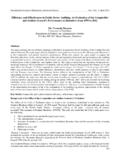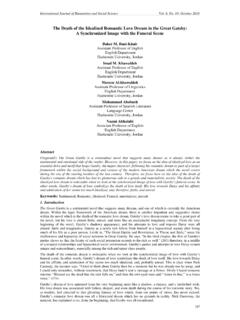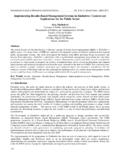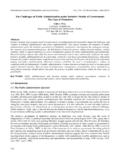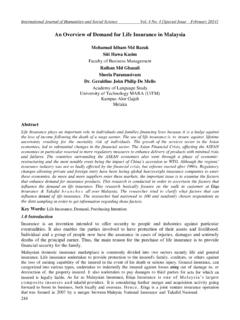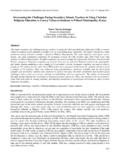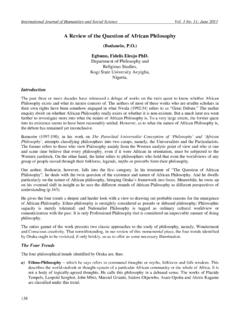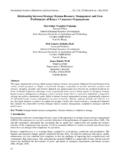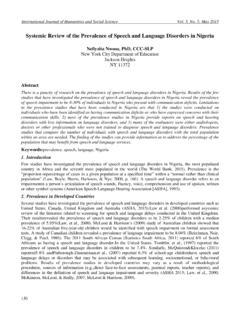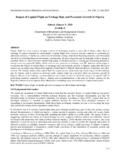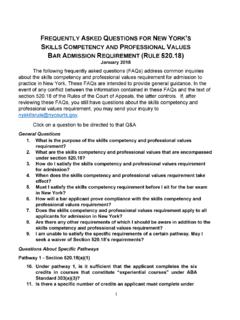Transcription of The Professional Competence of Teachers: Which qualities ...
1 International Journal of Humanities and Social Science Vol. 1 No. 21 [Special Issue - December 2011] 66 The Professional Competence of Teachers: Which qualities , attitudes, skills and knowledge contribute to a teacher s effectiveness? Maria Liakopoulou Researcher Aristotle University of Thessaloniki Makedonomaxon 53, Halastra Thessaloniki, 57 300 GREECE Abstract In this paper, the qualifications considered essential by teaching professionals to be effective in pedagogical and didactic work are put together based on the results of a national survey carried out in Greece, to Which secondary education teachers of all subjects contributed. One of the aims of this study was to systematically record the qualifications deemed essential by teachers for them to successfully perform their pedagogical and didactic duties.
2 The findings of this research verify the conclusions reached in related literature regarding a holistic approach to the tools making up the profile of a good teacher , as most teachers seem to associate their effectiveness at work with both personal traits and didactic and pedagogical skills , as well as pedagogical knowledge. These particular findings contributed to a systematic and analytical description of the content of Professional knowledge required for the successful performance of a teacher s pedagogical and didactic work. Keywords: teacher education, knowledge base of teaching, Professional knowledge, pedagogical studies, teachers qualifications 1. Introduction The basic functions schools are called upon to perform in the framework of compulsory education differ according to each situation.
3 However, apart from the specific needs of each time period and location, the main mission of a school is to ensure, on the one hand, excellent student performance, and on the other, the equal enjoyment of opportunities by all students. Schools, especially today, are asked to carry out these functions, taking into consideration the challenges of our times, such as multicultural co-existence, the dominance of technology, the evolution of the sciences and the rapid renewal of knowledge. At the same time, schools aim at preparing students not only for the present, but also for the ever-changing future. The abovementioned characteristics of the modern school define, to a great extent, a teacher s role too. A teacher should possess the qualifications and Professional knowledge required.
4 The question, therefore, is What qualifications are necessary for a teacher to be effective in his work? . A definitive and absolute definition of these qualifications is neither possible nor desirable, given the transient nature of teaching and the complexity of a teacher s role. However, a provisional list of these qualifications is essential for both the planning of teachers education programmes and the establishment of the criteria for the recruitment, evaluation and self-evaluation of teachers. What is definitive in the recording and definition of these qualifications is the influence of multiple factors, Which are referred to as spheres of influence (Corrigan & Haberman 1990, Christensen 1996, Imig & Switzer 1996). The contribution of working teachers is of primary importance, as they have the experience gained from actual practice and are therefore in a position to evaluate their needs in terms of the qualifications that can facilitate their work and guarantee their term that has been used over the past few years to render the matter of teachers qualifications is Competence .
5 In the framework of a broader perception of the term, a holistic approach is adopted (Ingvarson 1998 a & b), according to Which Competence presupposes the individual qualities and attitudes of teachers, as well as their skills and knowledge that arise as a result of their work. In this paper, the qualifications considered essential by teaching professionals to be effective in pedagogical and didactic work are put together based on the results of a national survey carried out in Greece, to Which secondary education teachers of all subjects contributed. The following questions were examined in detail: a) What qualities and attitudes contribute to a teacher s effectiveness? b) What skills and knowledge contribute to a teacher s effectiveness?
6 The Special Issue on Commerce and Social Science Centre for Promoting Ideas, USA 67 c) Do teachers use their pedagogical knowledge and skills in order to improve their pedagogical and didactic work? 2. Delineation of teachers Professional Competence Since the 1920s, the issue of teachers qualifications, Which can guarantee their effectiveness, has been of concern for not only the science of Pedagogy, but also for those in charge of staffing schools with qualified professionals. As regards this issue, modern studies have revealed that the way in Which a teacher carries out his work is determined by the union of his personality traits and acquired knowledge.
7 A good teacher should possess a wide range of qualifications, Which could, schematically, be classified as follows: . Personality traits, attitudes and beliefs These include personality traits related to the Professional role of a teacher , Which can be nurtured and developed through initial education and continuous training (Whitty 1996: 89-90). Specifically, studies have shown that traits such as flexibility in terms of the appearance of students, a sense of humour, a sense of fairness, patience, enthusiasm, creativity, care and interest in the students, all contribute to the effectiveness of teachers (Malikow 2005, Harslett et al. 2000). These also include a teacher s attitudes and beliefs on teaching, learning, his role, all of Which affect the way he chooses, evaluates and comprehends the knowledge acquired, as well as the way he benefits from this knowledge in practice, as this very practice is shaped by that knowledge (Feiman-Nemser 1990, Sch n 1983, Zeichner & Liston 1996).
8 The attitudes of teachers affect their degree of commitment to their duties, the way they teach and treat their students, as well as how they perceive their Professional growth (Chen & Rovegno 2000, Darling-Hammond 2000). Specifically, teachers that have high expectations for their students and insist on promoting learning for all students tend to be more effective ( Malikow 2005, McBer 2000). Another factor Which contributes to the effectiveness of teachers is a feeling of commitment to the job at hand (Coladarsi 2002) and interest in the personal life of students and their families (Harslett et al. 2000). Lastly, knowledge of self and contemplation are worth mentioning, in that they presuppose critical and careful reflection, on the part of the teacher , on his actions and self (Turner-Bisset 2001: 110-112).
9 McBer (2000), from a series of interviews with teachers, identified 16 Professional characteristics , including personality traits and individual attitudes, Which she then classified into five groups: a) Professionalism: commitment, confidence, trustworthiness, respect;. b) Thinking: analytic and conceptual thinking; c) Expectations: disposal of achievement of high objectives, disposal for permanent comprehension of reality ( the students, the order), and undertaking of initiatives; d) Leadership: flexibility, accountability, passion for learning; e) Relations with other: fertile interaction with involved in the educational process, skills of common work, comprehension.. Pedagogical Skills and Knowledge Didactic and pedagogical skills are not only understood as familiarisation with techniques that are then used mechanically, but also as the acquisition of routines Which , without a doubt, every teacher needs in order to save time and energy for the more significant aspects of his work; at the same time, they refer to a set of theoretical principles and research data that lead to a variety of techniques and strategies Which a teacher chooses and shapes, depending on the circumstances (for the discussion on teacher skills as an element of Professional competency , see Beyer 2002: 311, Conczi et al.
10 1990, Oser et al. 2006: 1-7). A plethora of related studies shows specific actions by teachers Which can be considered factors for their effectiveness. With regard to the teaching approach, it seems that the more effective teachers (McBer 2000, Jasman 2002, Anderson 2004): set realistic objectives, try and give incentives to students for learning, apply various teaching methods, select participative forms of teaching, test and create didactic material, present information in a clear manner, combine words with pictures, use various teaching aids, maximise teaching time through systematic measures ( planning, reduced disturbances in the classroom), assign work that will stir the interests of the students, monitor and evaluate the progress of students, set evaluation criteria for students and inform the students about them, and provide feedback to the students.
